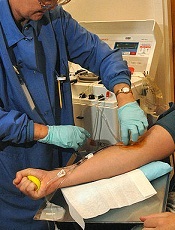User login

Photo by Charles Haymond
The US Food and Drug Administration (FDA) has cleared a labeling change for the Terumo BCT Trima Accel Automated Blood Collection System.
The change means platelets in plasma that are collected via this system can now be stored for 7 days instead of 5, but the blood products must be tested for bacterial contamination.
The label change also allows for use of a wireless feature designed to enhance the mobility and flexibility of the system.
The Trima Accel system includes the Trima Accel device, a tubing set, and Trima Accel software. The system uses a centrifuge to separate whole blood into platelets, plasma, and red blood cells. It then collects the components based on customer-configured priorities and the donor’s physiology and blood count.
Platelet storage
The FDA is now allowing platelets in 100% plasma that are collected via the Trima Accel system to be stored for up to 7 days post-collection. But platelets in isoplate solution can only be stored for up to 5 days.
For platelet storage up to 7 days, the FDA requires that every product be tested with a bacterial detection device cleared by the FDA and labeled as a “safety measure.”
Wireless feature
The newly cleared wireless feature connects the Trima Accel system to software applications such as the Cadence Data Collection System or the Vista Information System through the blood center’s or hospital’s existing wireless network.
This enables access to electronic donor information and reporting capabilities, with the goals of streamlining collections, simplifying data management, and allowing operators to focus on donor care, even when a wired connection is unavailable.
The wireless feature enables blood centers to either purchase a compatible wireless appliance from Terumo BCT or choose an appliance of their own for attachment to the Trima Accel system using a mounting bracket on the back of the system. ![]()

Photo by Charles Haymond
The US Food and Drug Administration (FDA) has cleared a labeling change for the Terumo BCT Trima Accel Automated Blood Collection System.
The change means platelets in plasma that are collected via this system can now be stored for 7 days instead of 5, but the blood products must be tested for bacterial contamination.
The label change also allows for use of a wireless feature designed to enhance the mobility and flexibility of the system.
The Trima Accel system includes the Trima Accel device, a tubing set, and Trima Accel software. The system uses a centrifuge to separate whole blood into platelets, plasma, and red blood cells. It then collects the components based on customer-configured priorities and the donor’s physiology and blood count.
Platelet storage
The FDA is now allowing platelets in 100% plasma that are collected via the Trima Accel system to be stored for up to 7 days post-collection. But platelets in isoplate solution can only be stored for up to 5 days.
For platelet storage up to 7 days, the FDA requires that every product be tested with a bacterial detection device cleared by the FDA and labeled as a “safety measure.”
Wireless feature
The newly cleared wireless feature connects the Trima Accel system to software applications such as the Cadence Data Collection System or the Vista Information System through the blood center’s or hospital’s existing wireless network.
This enables access to electronic donor information and reporting capabilities, with the goals of streamlining collections, simplifying data management, and allowing operators to focus on donor care, even when a wired connection is unavailable.
The wireless feature enables blood centers to either purchase a compatible wireless appliance from Terumo BCT or choose an appliance of their own for attachment to the Trima Accel system using a mounting bracket on the back of the system. ![]()

Photo by Charles Haymond
The US Food and Drug Administration (FDA) has cleared a labeling change for the Terumo BCT Trima Accel Automated Blood Collection System.
The change means platelets in plasma that are collected via this system can now be stored for 7 days instead of 5, but the blood products must be tested for bacterial contamination.
The label change also allows for use of a wireless feature designed to enhance the mobility and flexibility of the system.
The Trima Accel system includes the Trima Accel device, a tubing set, and Trima Accel software. The system uses a centrifuge to separate whole blood into platelets, plasma, and red blood cells. It then collects the components based on customer-configured priorities and the donor’s physiology and blood count.
Platelet storage
The FDA is now allowing platelets in 100% plasma that are collected via the Trima Accel system to be stored for up to 7 days post-collection. But platelets in isoplate solution can only be stored for up to 5 days.
For platelet storage up to 7 days, the FDA requires that every product be tested with a bacterial detection device cleared by the FDA and labeled as a “safety measure.”
Wireless feature
The newly cleared wireless feature connects the Trima Accel system to software applications such as the Cadence Data Collection System or the Vista Information System through the blood center’s or hospital’s existing wireless network.
This enables access to electronic donor information and reporting capabilities, with the goals of streamlining collections, simplifying data management, and allowing operators to focus on donor care, even when a wired connection is unavailable.
The wireless feature enables blood centers to either purchase a compatible wireless appliance from Terumo BCT or choose an appliance of their own for attachment to the Trima Accel system using a mounting bracket on the back of the system. ![]()